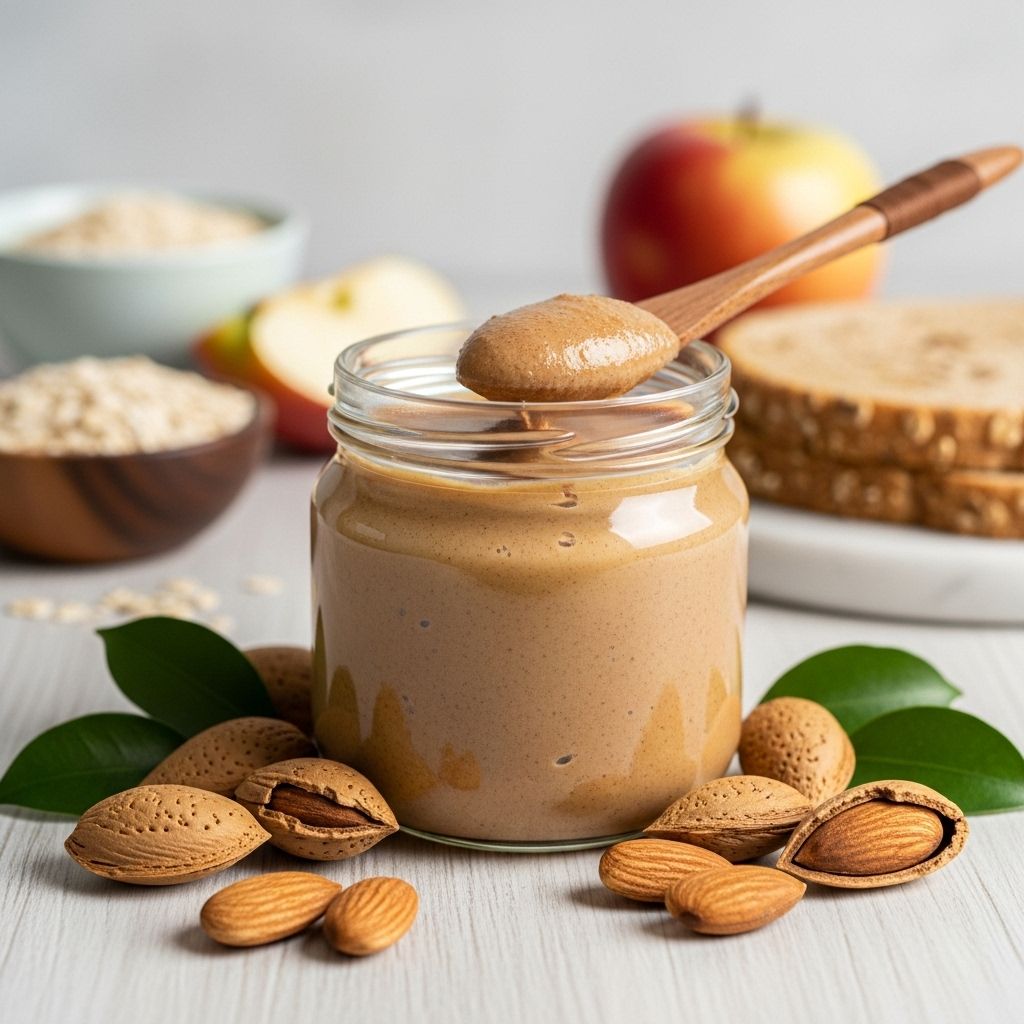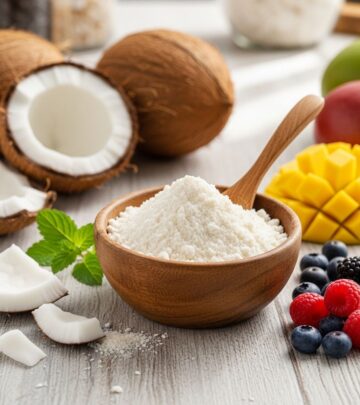Almond Butter Benefits: Nutrition, Health, and Uses
Discover versatile ways to boost your meals with this creamy, protein-rich nut spread.

Almond butter has swiftly emerged as a favorite among health-conscious individuals seeking a nutritious, plant-based spread with a rich flavor and wide-ranging health benefits. Packed with healthy fats, vitamins, minerals, and protein, almond butter is not just a tasty alternative to other spreads but also a functional food with proven impacts on heart health, weight management, blood sugar regulation, and more. This comprehensive guide explores all facets of almond butter—from its nutritional value to its benefits, comparisons, and creative ways to add it to your daily meals.
Table of Contents
- Almond Butter Nutrition Profile
- Key Health Benefits of Almond Butter
- Almond Butter vs. Peanut Butter
- Potential Side Effects and Considerations
- Delicious Ways to Use Almond Butter
- How to Make Almond Butter at Home
- Frequently Asked Questions (FAQs)
Almond Butter Nutrition Profile
Almond butter is revered for its exceptionally nutrient-dense composition, offering an impressive balance of macronutrients and micronutrients in every serving. Here’s a breakdown of what makes it so wholesome:
| Nutrient (per 1 tbsp) | Amount |
|---|---|
| Calories | 96 kcal |
| Total Fat | 8.9 g |
| • Saturated Fat | 1.1 g |
| • Monounsaturated Fat | ~5.1 g |
| • Polyunsaturated Fat | ~1.7 g |
| Carbohydrates | 3 g |
| Fiber | 1.7 g |
| Sugar | 1 g |
| Protein | 3.4 g |
| Magnesium | 44.6 mg |
| Iron | 0.6 mg |
| Vitamin E | 3.9 mg |
| Riboflavin (B2) | 0.2 mg |
| Calcium | 55.5 mg |
Almond butter also contains small amounts of potassium, phosphorus, zinc, folate, and B vitamins. The high amount of monounsaturated and polyunsaturated fats along with antioxidants (like vitamin E) set almond butter apart as both nourishing and heart-healthy.
Key Health Benefits of Almond Butter
Adding almond butter to your diet can deliver a suite of science-supported health benefits, thanks to its unique nutrient blend. Here are its standout advantages:
1. Supports Heart Health
- Rich in heart-friendly fats: Almond butter’s monounsaturated and polyunsaturated fats contribute to lower LDL (bad) cholesterol and support overall cardiovascular health.
- Vitamin E and magnesium bolster blood vessel function and act as antioxidants, helping reduce oxidative stress and arterial plaque buildup.
- Regular intake (a small handful of nuts or 30g daily) has been associated with up to a 30% reduced risk of heart attack, stroke, and cardiovascular death.
2. Aids in Weight Management
- High satiety value: The protein, fiber, and healthy fat combination in almond butter promotes feelings of fullness and reduces unhealthy snacking.
- Randomized trials associate regular nut consumption with lower BMI and reduced waist circumference, despite their relatively high calorie content.
- Consuming nuts like almonds in moderation (about two tablespoons per day) has not been linked to weight gain and may help prevent obesity.
3. Helps Control Blood Sugar
- Almond butter has a low glycemic impact, meaning it causes only mild rises in blood sugar compared to carbohydrate-rich spreads.
- Magnesium and fiber play a role in improving insulin sensitivity and glucose metabolism, important for people with or at risk for type 2 diabetes.
- Systematic reviews show that incorporating tree nuts may slightly lower hemoglobin A1C and fasting blood glucose levels.
4. Portable Source of Energy
- Almond butter is shelf-stable and energy-dense, making it an ideal portable snack for work, school, or outdoor activities.
- Easy to pair with fruit, vegetables, or whole grains for sustained energy between meals.
5. Enhances Brain and Cognitive Health
- Almond butter contains vitamin E, B vitamins, and antioxidants that help protect the brain from oxidative stress and inflammation, which are linked to age-related cognitive decline.
- Habitual nut consumption in mid-life is associated with less cognitive impairment later in life, though ongoing research continues to clarify the extent of benefit.
6. Boosts Skin Health
- Almond butter is a superb source of vitamin E, an antioxidant shown to protect skin from environmental damage, including UV rays and free radicals.
- Regular intake supports skin repair, elasticity, and better hydration.
7. Provides Essential Micronutrients
- In addition to vitamin E and magnesium, almond butter supplies calcium, iron, riboflavin, and potassium, all vital for bone strength, oxygen transport, and metabolic health.
Almond Butter vs. Peanut Butter: A Nutritional Comparison
| Aspect | Almond Butter | Peanut Butter |
|---|---|---|
| Calories (per tbsp) | 96 kcal | ~95 kcal |
| Total Fat | 8.9 g | 8.0 g |
| Saturated Fat | 1.1 g | 1.6 g |
| Monounsaturated Fat | ~5.1 g | ~4.0 g |
| Polyunsaturated Fat | ~1.7 g | ~2.7 g |
| Fiber | 1.7 g | 1.0 g |
| Protein | 3.4 g | 3.5 g |
| Vitamin E | 3.9 mg | 2.4 mg |
| Magnesium | 44.6 mg | 26 mg |
| Calcium | 55.5 mg | 17 mg |
| Iron | 0.6 mg | 0.3 mg |
| Added Sugars / Salt (store-bought) | Low if unsweetened | Varies |
Key Takeaways:
- Almond butter generally contains more fiber, vitamin E, calcium, and magnesium than peanut butter.
- Both spreads are good protein sources and offer similar calorie content. Almond butter is considered slightly superior nutritionally due to its micronutrient profile.
- Read labels: Some commercial nut butters contain added sugar, unhealthy oils, and salt; look for unsweetened, natural varieties for the best health benefits.
Potential Side Effects and Considerations
- Caloric density: While healthy, almond butter contains concentrated calories. Moderation (1–2 tablespoons daily) is advised for most adults to avoid unintended weight gain.
- Omega-6 fatty acids: An ounce (about two tablespoons) contains over 3,000 mg of omega-6s. Excessive omega-6 relative to omega-3 may promote inflammation, so balance your diet with omega-3-rich foods.
- Nut allergies: Individuals with almond or other tree nut allergies must avoid almond butter.
- Store-bought varieties: Many contain sugar, salt, and oils. Unsweetened, natural almond butter is healthiest.
Delicious Ways to Use Almond Butter
Almond butter’s creamy texture and subtle nutty taste make it an adaptable ingredient for sweet or savory applications. Some easy and nutritious ideas:
- Spread thickly on whole-grain toast with banana or berry slices.
- Stir into oatmeal, yogurt, or chia pudding for creaminess and protein.
- Use as a dip for apple slices, celery, carrots, or rice cakes.
- Add to homemade smoothies or protein shakes for a nutty boost.
- Swirl into baked goods (muffins, energy balls, brownies) for flavor and texture.
- Replace peanut butter in dressings, sauces, and satays for a unique twist.
How to Make Almond Butter at Home
Want total control over your almond butter? Making it at home is simple, cost-effective, and ensures you avoid unwanted additives.
- Ingredients: 2 cups of raw almonds (optionally lightly roasted), pinch of salt to taste.
- Preheat oven to 350°F (175°C). Spread almonds on a tray and roast for 8–10 minutes for enhanced flavor (optional).
- Let almonds cool, then transfer to a food processor or high-speed blender.
- Process on high, stopping occasionally to scrape down sides. Initially, almonds turn to meal, then a crumbly paste, and finally buttery and smooth (about 10–15 minutes total).
- Add salt or a drizzle of honey for flavor, if desired.
- Store in an airtight jar in the refrigerator for up to 4 weeks.
Frequently Asked Questions (FAQs)
Q: Does almond butter help you lose weight?
Almond butter, when enjoyed in moderation, can help you feel full due to its protein and fiber content. This can reduce overall snacking and contribute to weight management, but will not directly cause fat loss without a healthy overall diet and habits.
Q: Is almond butter better than peanut butter nutritionally?
Almond butter contains more fiber, vitamin E, and minerals like calcium and magnesium than peanut butter, making it slightly superior nutritionally. Both offer healthy fats and protein, and the best choice often depends on taste preference and absence of allergies.
Q: Can people with diabetes eat almond butter?
Yes. Unsweetened almond butter has a low impact on blood sugar and contains magnesium, which supports better glucose and insulin regulation. Always choose natural varieties without added sugar or salt for optimal benefits.
Q: Are there any risks in eating almond butter?
Almond butter is safe for most people, but should be avoided by those with almond or tree nut allergies. It is calorie-dense, so overconsumption can contribute to weight gain. Watch for added sugar and unhealthy oils in store-bought options.
Q: How does almond butter support skin health?
The vitamin E in almond butter acts as a powerful antioxidant, protecting skin from oxidative stress and sun damage, supporting skin repair, and improving overall skin texture.
Conclusion
Almond butter is more than a delicious spread; it’s a healthful addition to any balanced diet. Rich in heart-healthy fats, protein, vitamins, and minerals, it promotes cardiovascular, skin, brain, and metabolic health. Choose natural, unsweetened varieties, enjoy in moderation, and explore almond butter’s versatility in both sweet and savory dishes for optimal benefits. If you’re looking for a wholesome, plant-powered source of nutrition and flavor, almond butter makes a stellar choice.
References
- https://www.stylecraze.com/articles/almond-butter-vs-peanut-butter/
- https://www.signos.com/blog/almond-butter-nutrition
- https://www.hollandandbarrett.com/the-health-hub/food-drink/food/almond-butter-benefits/
- https://www.maranathafoods.com/health-facts/almonds/
- https://www.healthline.com/health/food-nutrition/almond-butter-peanut-butter
Read full bio of medha deb













